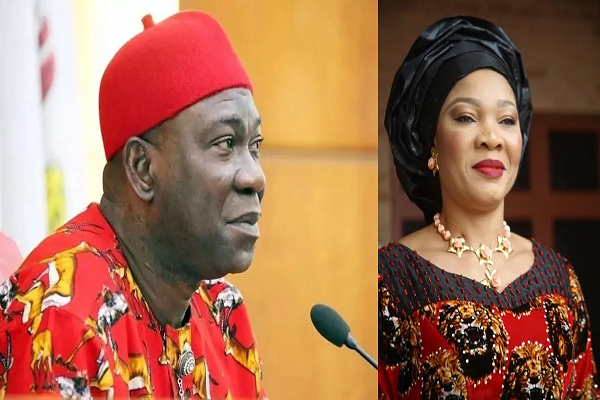
Shortly after last Thursday’s first of its kind organ harvesting conviction of former Deputy Senate President, Ike Ekweremadu, and his wife, Beatrice, alongside Dr. Obinna Obeta at the Central Criminal Court, a.k.a. Old Bailey, her barrister, Anu Mohindru, KC, made efforts for her to remain on conditional bail till the provisional day of sentencing on Friday, May 5, 2023, but the Crown’s Hugh Davies, KC, who had raised the “bail” matter rose to his feet immediately to block the defence application.
While Mohindru argued that the court should consider the plight of the couple’s daughter, Sonia, who is said to sometimes “black out” and needs support to attend her thrice weekly dialysis sessions at the Royal Free Hospital, Davies convinced the judge that the Ekweremadus have the means to enable the Senator’s wife jet out of the United Kingdom, including by using “forged identification documents.”
The prosecutor referenced the forged affidavit that was tabled during the trial to make his case. He was of the view that if they could produce false documents to claim Sonia and David Nwamini – who triggered the case on May 5, last year, when he went to the police to report that he was trafficked to the UK by unknown people – were maternal cousins, then Mrs Ekweremadu could therefore conjure false identification documents to make her way out of the UK.
Though Mohindru argued to the contrary, noting that the false documents were fabricated in Nigeria and not in the UK, the judge didn’t budge.
Although he acknowledged that she had “maintained the bail conditions” and always “arrived in court on time”, he sided with the Crown’s position. Thus, she was taken to prison – sent down – immediately from the dock rather than being allowed to go home with Sonia.
When Mohindru raised the need for the judge to be compassionate, considering especially the needs of Sonia, and the emotional impact of the convictions of her parents, Justice Johnson argued that he wasn’t going to take any chances by allowing Mrs Ekweremadu enjoy a few weeks of freedom. He said Sonia’s siblings could provide the support she needs.
Not surprisingly, various reactions immediately trailed the convictions of the former second topmost senator of the Federal Republic of Nigeria. A sympathetic friend of the family said to one of the Ekweremadus’ sons, “l can’t believe they did that to your mother.”
Some members of the Nigerian community, who had been attending the trial for several weeks, fingered the defence barristers – except Sonia’s – as not “doing enough.” Some felt the defence barristers should have been changed.
Despite that, another friend of the family said: “It’s a terrible jury.”
A member of the Nigerian community, who had twice served as a juror in two separate cases more than five years ago, told The Guardian that it’s not just the trial evidence that jurors look at in the jury room.
“Emotions” and a lot of other things, including if the foreman or any other juror(s) is dominant. These, according to him, could sway where the pendulum of the verdict swings.
The convictions of Ekweremadus and Obeta set an unenviable record by becoming the first to be jailed for the organ harvesting crime strand of the Modern Slavery Act.











No comments:
Post a Comment